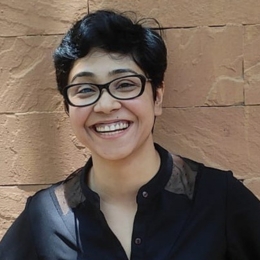NLS Faculty Dr. Salmoli Choudhuri Awarded Koch History Centre Fellowship, University of Oxford
October 16, 2025
 We are pleased to share that NLS faculty Dr. Salmoli Choudhuri was recently awarded the Koch History Centre Fellowship by the University of Oxford. The names of the inaugural Koch History Centre Fellows were announced by the Faculty of History and Wadham College, Oxford for the academic year 2025-2026 on the theme ‘Religion and the State’. Salmoli is also the only Koch History Centre Fellow from the Global South.
We are pleased to share that NLS faculty Dr. Salmoli Choudhuri was recently awarded the Koch History Centre Fellowship by the University of Oxford. The names of the inaugural Koch History Centre Fellows were announced by the Faculty of History and Wadham College, Oxford for the academic year 2025-2026 on the theme ‘Religion and the State’. Salmoli is also the only Koch History Centre Fellow from the Global South.
“The Fellows will pursue independent research projects while at the Centre, coming together to discuss the historiographical implications of their work through a regular seminar series,” said a statement on the Oxford University website.
About Salmoli Choudhuri
Salmoli is an intellectual historian of legal and political concepts that have played a foundational role in shaping modern and contemporary India and informing global thought. At the National Law School of India University, Bengaluru, she has taught subjects ranging from administrative law and jurisprudence to global ideas of freedom. In addition to developing her doctoral thesis on Tagore and freedom into a monograph, she has begun a new project on juristic ideas of state-thinking in anticolonial political thought. Her work has appeared in journals such as Political Theology, Global Intellectual History, and Economic and Political Weekly.
Over the last year, Salmoli was at Humboldt University, Berlin on the Alexander von Humboldt Fellowship from October 2024 to September 2025. During her time as a Fellow at Humboldt, she worked on a monograph on Tagore and freedom.
More about her research
As a Koch Junior Fellow, alongside completing her book, she will begin a new project on the history of the state in Indian political thought and its conceptualisation in law and religion through juristic and sacral ideas from the interwar period to the mid-twentieth century. Since India was under foreign rule, the State was rarely an object of serious attention in anticolonial thought, which remained preoccupied with questions of nationalism and self-determination; by adopting a new focus, her project seeks to recover a distinct line of thinking about the state in Hindu and Buddhist thought during the late colonial period.

